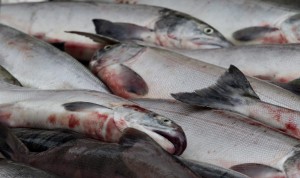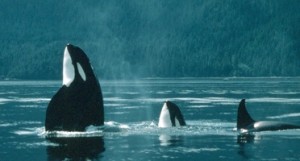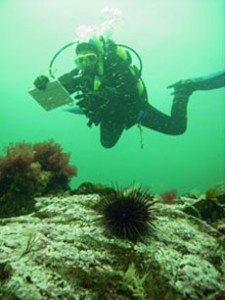As promised in my previous blog, below my rant is a sampling of the latest marine and aquatic science program and job cuts. We decided to include the controversial shutting down of one of Canada’s busiest Coast Guard search and rescue stations (Kitsilano), which has left many people outraged at what they perceive as a lack of sufficient concern for maritime safety.

We have also listed Canadian environmental legislation that is up for serious modifications, including the venerable Fisheries Act. Dating back to confederation, this is one of Canada’s oldest pieces of legislation. It was revised in 1985, and is up for revision again as part of the omnibus package known as Bill C-38, which includes 60 (yes, six-oh) pieces of legislation. Some have concerns that placing the Fisheries Act in this massive package might not be affording it the careful consideration it deserves. It turns out that four former fisheries ministers, of both Liberal and Conservative colours, and the Federation of Canadian Municipalities also share this concern.
One significant change to the Fisheries Act is the narrowing of its focus to consider only species of commercial value. If other species of no commercial value are affected by fishing, say, or other human activities like, um, oil tanker traffic, then it doesn’t matter because they have no “value”. That could range from stately deep sea coral gardens, long-lived and far-travelling sea turtles, ugly (yet cute) wolf eels, scary sharks (even if they are really just basking), Jurassic Park glass sponge reefs, and the multitude of watery-fleshed deep sea critters like the blobfish (a face only Mother Nature could love) – unless we happen to eat them, of course.
Now some of these species may have a back-up plan, being protected by the Species at Risk Act (SARA). However, my sources tell me that this loophole is going to get fixed soon enough, with plans to narrow SARA’s focus as well to just a small handful of worthwhile species.
It is very tempting to conclude that marine scientists will soon go extinct in Canada, but I have been assured that those scientists who study things of commercial value, like tasty fish, will be able to keep their jobs.
In the words of Sylvia Earle, “No water, no life. No blue, no green.”
Until the next blog,
Jeff Ardron
President of the Board
*The list below is surely incomplete – it includes personal communications and provides media coverage links where applicable. Please send us your comments on what else is going on in Canada. And consider participating in campaigns like Wear Green Canada, BlackOut SpeakOut, or Blackmark.
Programs, services, and jobs at a number of agencies are being cut, with Parks Canada one of the hardest hit and small communities likely to feel the effects most, as reported by: The Huffington Post, CBC News, The Vancouver Sun, The Canadian Parks and Wilderness Society, and The Society for Historical Archaeology.
Cuts to Environment Canada threaten water resources, waste management, climate change and clean air, as well as weather and environmental services.

Environmental Health News.
Information on cuts to the Experimental Lakes Science Program in Ontario can be found here: The Vancouver Sun and the journal Nature.
The only Emergency Office for oil spills in BC is scheduled to be closed, with the offices instead centralized in Ottawa and Montreal. Also, Coast Guard Marine Traffic Services are being cut, reducing the number of centres in charge of mariner safety in Canadian waters.

Information on cuts to the Kitsilano Coast Guard station can be found here: The Vancouver Sun and CTV.
Note that Marine Rescue Sub-Centers in St. Johns and Quebec City are under threat, and closures have been announced for Marine Communication and Vessel Traffic facilities in Vancouver, Comox and Tofino.
Bamfield Marine Station on Vancouver Island is losing its annual DFO funding (which comprises 35% of its budget) in two years. Other research funding on the chopping (or serious reduction) block includes NSERC Discovery Grants, which support students and research programs especially at small institutions, and Research Tools and Instruments, which formerly supported infrastructure (universities have been told to find funds for their researchers internally). This article describes some of these cuts and more. Also, we have been told that Defence Science Labs have recently been cut 13%.
Environmentally-focused charities are also in danger, as the Natural Resources Minister has claimed that foreign-funded “radical” organizations are determined to “hijack” Canada’s need to develop natural resources, and the Canada Revenue Agency has been instructed to target these groups with audits and withhold new charitable designations.
For an editorial on Bill C-38, see this Globe & Mail article.
While not as “new” news, the muzzling of Canadian scientists remains particularly disturbing. It has been reported by both Science and Nature journals, and discussed by the Canadian Science Writers’ Association and at the recent AAAS conference. There are also concerns of a “brain drain” due to these changes, and of course that “the environment is a huge loser in this budget” as noted by UVic’s Andrew Weaver.
Finally, this site presents recent changes with an artistic flair, such as:
• Gutting the Fisheries Act,
• Trashing the Environmental Assessment Act,
• Overruling the National Energy Board,
• Barring environmental groups from hearings,
• Barring Canadian citizens from hearings (unless they live or work in the area),
• Speeding up environmental reviews,
• Slashing Environment Canada’s budget,
• Silencing the Scientists (and anyone who disagrees with the Harper Government – also see this post), and
• Lifting the 40 year ban on tankers on B.C.’s coast.
Again, please add any news that we may have missed – thank you.